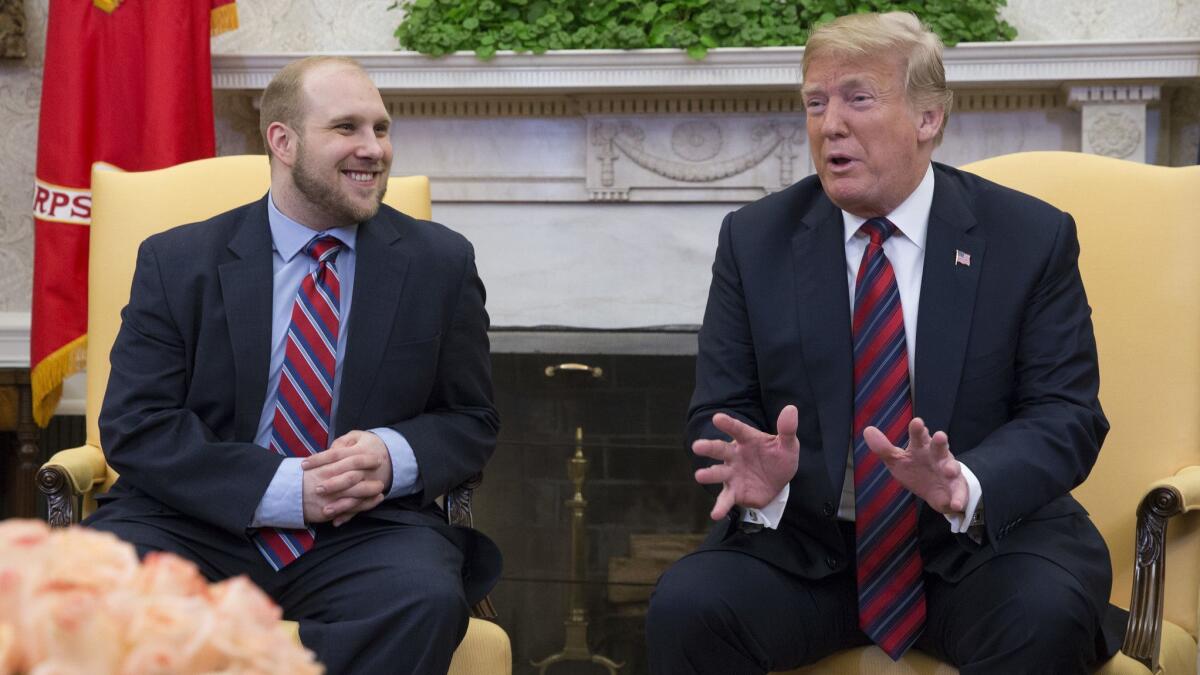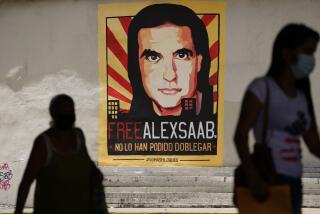U.S. citizen jailed for two years in Venezuela says he’s ‘overwhelmed with gratitude’ after release

- Share via
Reporting from Washington — A Utah man who was imprisoned in Venezuela amid deteriorating ties between the United States and Venezuela and languished for nearly two years in a Caracas jail was released Saturday.
The family of Joshua Holt, 26, announced his release in a statement, and President Trump later confirmed it on Twitter, though the president referred incorrectly to Holt as a hostage.
“Good news about the release of the American hostage from Venezuela,” Trump wrote, adding that the man and his family were expected Saturday evening in Washington for a ceremony at the White House.
“The great people of Utah will be very happy!” Trump added.
Holt appeared with Trump at the White House on Saturday night after he was flown out of Venezuela, accompanied on the flight by Sen. Bob Corker (R-Tenn). Trump said Holt was one 17 Americans held overseas who have been freed under his administration.
Holt said, “I’m just overwhelmed with gratitude for everything you guys have done.” His mother, Laurie Holt, also at the White House ceremony, added thanks for Venezuelan President Nicolas Maduro for finally releasing her son.
Trump thanked four congress members who joined the group in the Oval Office, who thanked him in turn.
Holt’s wife, Thamara Candelo, who is Venezuelan, had also been detained with Holt when he traveled to Venezuela for their wedding. The Mormon missionary and his new wife had planned to spend the summer of 2016 in Caracas while awaiting U.S. visas for Candelo and her children. He was arrested on weapons charges but never tried.
Laurie Holt said her son suffered respiratory problems, kidney stones and other ailments while in jail and lost considerable weight. During his White House visit, Holt had changed into a suit and tie and appeared in good health, if tired.
Holt’s relatives had pressed his case insistently, and although U.S. officials initially kept a low profile, they eventually became more vocal in demanding his release. But talks with the socialist Venezuelan government were complicated by diplomatic tensions and Venezuela’s deepening social and economic crisis.
Holt was freed just weeks after he made a chilling, clandestine video begging for help and saying his life was in danger because of deadly riots and fires in several Venezuelan prisons.
Also advocating for Holt was Corker, chairman of the Foreign Relations Committee, who traveled to Caracas and met with Maduro on Friday.
Just days earlier, Maduro had expelled the top two U.S. diplomats in Venezuela, accusing them of plotting to sabotage last Sunday’s presidential election. Maduro blames much of the humanitarian disaster gripping his once oil-rich nation on foreign interference.
Maduro won the election handily. The United States and several Latin American countries condemned the election as a sham because most of Maduro’s key opponents were jailed and his loyalists control most of the press, the courts and all the major government institutions that oversee elections.
One of the diplomats expelled was the charge d’affaires, Todd Robinson, who after the prison unrest this month went to the Foreign Ministry to demand officials give him information on Holt’s condition. They refused to see him, Robinson said at the time.
Washington and Caracas have not exchanged ambassadors since 2010, making Robinson the most senior U.S. official there. The Trump and Obama administrations have imposed numerous economic sanctions on the Maduro government, accusing many senior officials of enriching themselves through drug trafficking and money laundering.
However, there have been intermittent efforts over the last several years to reduce tensions between the two countries and find ways for peaceful political changes in Venezuela. In addition, at least as long ago as March, back-channel talks had opened between U.S. congressional advisors and Venezuelan officials to discuss, among other issues, freeing Holt.
On May 17, State Department spokeswoman Heather Nauert again demanded Holt’s release and said the administration held the Maduro government responsible for Holt’s safety. Francisco Palmieri, acting assistant secretary of State for Western Hemisphere affairs, conveyed a similar message to Venezuelan officials in Washington.
What changed Maduro’s mind now is unclear. He may be hoping for relief from some of the sanctions, or an easing of diplomatic isolation. Neither is likely to be forthcoming, however.
Laurie Holt and U.S. officials insisted all along that Joshua Holt and his wife were innocent, perhaps victims of the intense suspicion with which many Venezuelan officials regard Americans.
UPDATES:
9:25 p.m.: This article was updated with Joshua Holt’s visit to the White House.
This article was originally published at 11:20 a.m.
More to Read
Sign up for Essential California
The most important California stories and recommendations in your inbox every morning.
You may occasionally receive promotional content from the Los Angeles Times.











